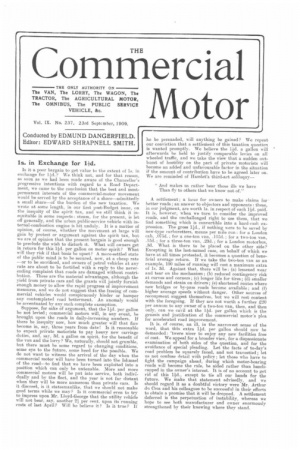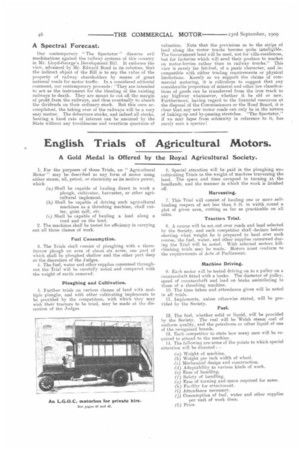is. in Exchange for lid.
Page 1

Page 2

If you've noticed an error in this article please click here to report it so we can fix it.
is it a poor bargain to get value to the extent of is. in exchange for lid.? We think not, and for that, reason, as soon as we had been made aware of the Chancellor's progressive intentions with regard to a Road Department, we came to the conclusion that the best and mostpermanent interests of the commercial-motor movement would be served by the acceptance of a share—admittedly a small share—of the burden of the new taxation. We wrote at some length, in our first post-Budget issue, on the inequity of the spirit tax, anti we still think it inequitable in some respects : steam, for the present, is let off generally, and the urban public-service vehicle with internaI-combustion engine is hit unduly. It is a matter of opinion, of course, whether the movement at large will gain by protest or argument against the spirit tax, but we are of opinion that the present bargain is good enough to preclude the wish to disturb it. What will owners get in return for this lid. per gallon on motor spirit? What will they risk if that basis be upset? A more-settled state of the public mind is to be secured, now, at a cheap rate —or to be sacrificed, and owners of petrol vehicles at any rate are about to be fortified with a reply to the neverending complaint that roads are damaged without contribution. These are the material advantages, although the yield from private cars and the grants will jointly furnish enough money to allow the rapid progress of improvement measures, and we do not suggest that the freeing of commercial vehicles would conspicuously hinder or hamper any contemplated road betterment. An anomaly would be accentuated by any such complete exemption. Suppose, for sake of argument, that the 10. per gallon be not levied; commercial motors will, in any event, be brought upon the roads in daily-increasing numbers. If there be inequity now, how much greater will that flaw become in, say, three years from date! Is it reasonable to expect private motorists to pay heavy new carriage duties, and, say, 3d. a gallon on spirit, for the benefit of the van and the lorry ? We, naturally, should not grumble, but there must he some regard to changing conditions, some eye to the future, some heed for theible. We do not want to witness the arrival of the ci)a7 when the commercial motor will have been turned into the Ishmael of the road—to find that we have been exploited into a position which can only be untenable. More and more commercial motors will be put into service, both individually and by the fleet, and the year is not far distant when they will be more numerous than private cars. Is it discreet, is it statesmanlike, that we should not make good terms while we may ? Is it commercial even to try to impress upon Mr. Lloyd-George that the utility vehicle will not bear, say, another 21 per rent. upon its running costs of last April? Will he believe it ? Is it true ? If
he be persuaded, will anything be gained ? We repeat our conviction that a settlement of this taxation question is wanted promptly. We believe the lid. a gallon will afterwards be held to justify comparable levies on all wheeled traffic, and we take the view that a sudden outburst of hostility on the part, of private motorists will become an added and unfavourable factor in the situation if the amount of contribution have to be agreed later on. We are reminded of Hamlet's third-act soliloquy " And makes us rather bear those ills we have Than fly to others that we know not of."
A settlement; a locus for owners to make claims for • better roads; an answer to objectors and opponents : these, in our judgment, are worth is. in respect of each lid. paid. It is, however, when we turn to consider the improved roads, and the unchallenged right to use them, that we find something which is convertible into a hard-cash expression. The gross lid., if nothing were to be saved by new-type c.arhuretters, means per mile run : for a London cab, .075(1. ; for a one-ton van, .115d.: for a two-ton van, .15d. ; for a three-ton van, .23d.; for a London motorbus, .3d. What is there to be placed on the other side? Exempting in the last-named case, on behalf of which we have at all times protested, it becomes a question of beneficial average return. If we take the two-ton van as an example, 100 miles of running will cost a maximum extra of Is. 3d. Against that, there will be : (a) lessened wear and tear on the mechanism ; (b) reduced contingency risk at curves and corners ; (c) longer life for tires; (d) smaller demands and strain on drivers; (e) shortened routes where new bridges or by-pass roads become available ; and (f) higher average speeds without danger. Other sources of recoupment suggest themselves, but we will rest content with the foregoing. If they are not worth a further 220 per annum to any owner of a two-ton van, then, and then only, can we cavil at the lid. per gallon which is the genesis and justification of the commercial motor's plea for accelerated road improvement.
It is, of course, an ill, in the narrowest sense of the word, that this extra lid. per gallon should now be demanded : 'twere nicer to enjoy any new facilities free of cost. We appeal for a broader view, for a dispassionate examination of both sides of the question, and for the avoidance of special pleading. Let the facts of to-day's road problem be squarely faced, and not travestied; 'let us not confuse detail with policy; let those who have to fight the campaign ahead, during which motor-bearing roads will become the rule, be aided rather than handicapped in the owner's interest. It is of no account to get rid of this lid., except to tie all our hands for the future. We make that statement advisedly, and we should regard it as a doubtful victory were Mr. Arthur do Oros and his colleagues to be successful in their efforts to obtain a promise that it will be dropped. A settlement deferred is the perpetuation of instability, whereas we hope to see both manufacturer and owner enormously strengthened by their knowing where they stand.
A Spectral Forecast.
Our contemporary " The Spectator " discerns evil machinations against the railway systerns of this country in Mr. Lloyd-George's Development Bill. It endorses the view, advanced by Mr. Edward Bond in it columns, that the indirect object of the Bill is to sap the value of the property of railway shareholders by means of great national roads for motor traffic. In a. considered editorial comment, our contemporary proceeds : "They are intended to act as the instrument for the bleeding of the existing railways to death. They are meant to cut off the margin of profit from the railways, and thus eventually to absorb the dividends on their ordinary stock. But this once accomplished, the taking over of the railways will be a very easy matter. The debenture stocks, and indeed all stocks, bearing a fixed rate of interest can be assumed by the State without any troublesome and vexatious questions of valuation. Note that the provisions as to the strips of land along the motor tracks become quite intelligible. The Government land will be used, not for villa-residences, but for factories which will send their produce to market on motor-lorries rather than in railway trucks." This view is surely far fetched, of a panic character; and incompatible with either trading requirements or physical limitations. Keenly as we support the claims of commercial motoring, it is ridiculous to suggest that any considerable proportion of mineral and other low classifications of goods can be transferred from the iron track to any highway whatsoever, whether it be old or new. Furthermore, having regard to the financial resources at the disposal of the Commissioners or the Road Board, it is clear that any new motor roads can only be in the nature of linking-up and by-pnssing stretches. "The Spectator," if we may lapse from solemnity in reference to it, has surely seen a spectre!






















